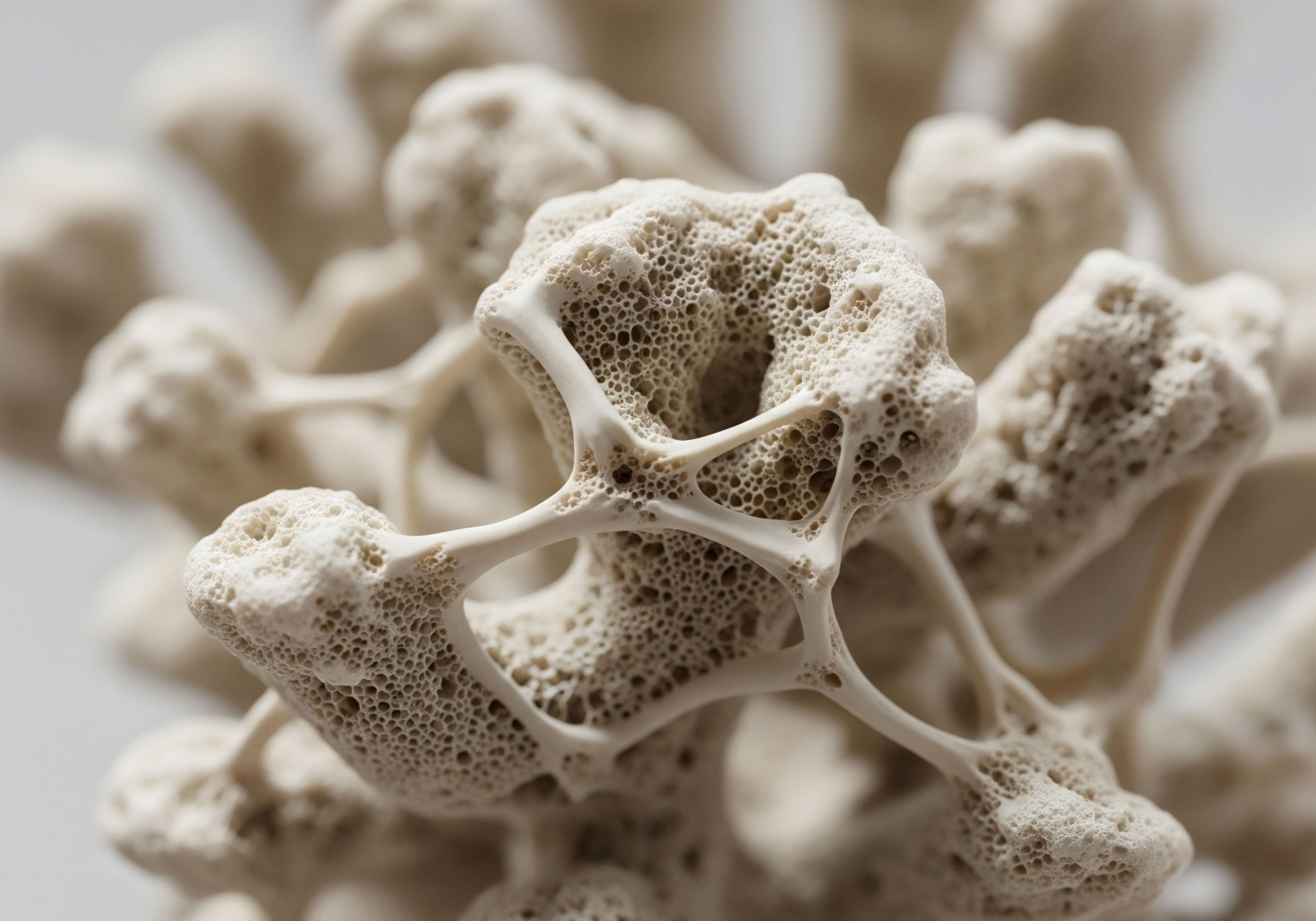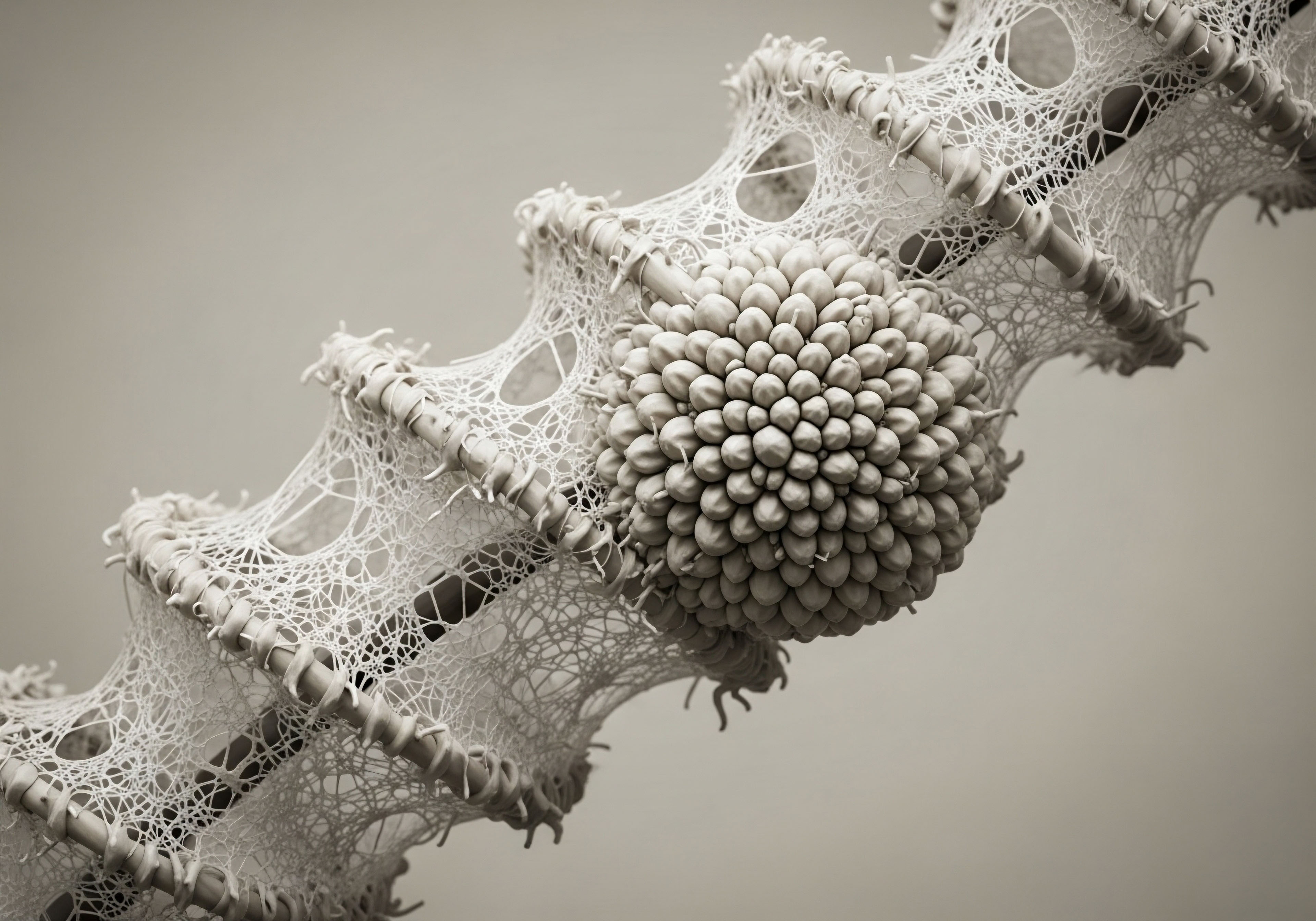

Fundamentals
Have you noticed a subtle shift in your daily experience, perhaps a persistent feeling of diminished energy, a recalcitrant weight gain, or a less vibrant sense of self than you once knew? Many individuals attribute these changes to the unavoidable march of time, accepting them as an inherent part of aging.
Yet, these sensations often signal a deeper, more intricate story unfolding within your biological systems. Your body communicates through a sophisticated network of chemical messengers, and when these signals falter, the impact reverberates throughout your entire being. Understanding these internal communications offers a pathway to reclaiming your vitality.
The endocrine system, a master conductor of your internal symphony, orchestrates virtually every physiological process. This complex network comprises glands that secrete hormones directly into the bloodstream, acting as precise signals to distant target cells and organs. These chemical messengers regulate everything from your metabolism and mood to your sleep cycles and reproductive health.
As years pass, the efficiency of this system can gradually diminish, leading to what is often termed age-related hormonal decline. This natural progression does not, however, mean that you are powerless to influence its trajectory.
Subtle shifts in well-being often indicate changes within the body’s intricate hormonal communication network.
Consider the role of your diet in this delicate balance. The foods you consume provide the fundamental building blocks and regulatory signals for every cellular process, including hormone synthesis and metabolism. A diet rich in processed ingredients, inflammatory fats, and excessive sugars can disrupt cellular function, leading to systemic inflammation and insulin resistance.
These conditions directly impair hormonal signaling, creating a cascade of imbalances that can manifest as the very symptoms you experience. Conversely, a thoughtfully constructed dietary approach can supply the necessary nutrients to support endocrine function, potentially mitigating the effects of time on your hormonal health.

The Endocrine System’s Orchestration
Your endocrine glands, including the adrenal glands, thyroid gland, pituitary gland, and gonads, work in concert to maintain physiological equilibrium. Each gland produces specific hormones, such as cortisol from the adrenals, thyroid hormones from the thyroid, and testosterone or estrogen from the gonads.
These hormones circulate, binding to specific receptors on target cells, thereby initiating a particular cellular response. This precise lock-and-key mechanism ensures that each hormone delivers its message to the correct recipient, maintaining the body’s intricate internal regulation.
A critical aspect of this system is the concept of feedback loops. When hormone levels are optimal, the body signals the producing gland to reduce its output, preventing overproduction. Conversely, if levels drop too low, a signal prompts increased production. This self-regulating mechanism ensures stability.
Age-related changes can affect various points in these feedback loops, from the initial signaling in the brain (hypothalamus and pituitary) to the responsiveness of the target glands themselves. Dietary choices can influence these feedback mechanisms, either supporting their proper function or contributing to their dysregulation.

Dietary Foundations for Hormonal Health
What does a diet supportive of hormonal balance truly entail? It begins with prioritizing whole, unprocessed foods that supply a broad spectrum of micronutrients. These include vibrant fruits and vegetables, lean protein sources, and healthy fats. Each of these components plays a distinct, yet interconnected, role in supporting endocrine function.
- Proteins ∞ Provide amino acids, the foundational components for peptide hormones and neurotransmitters.
- Healthy Fats ∞ Supply cholesterol, a precursor for steroid hormones like testosterone, estrogen, and cortisol.
- Complex Carbohydrates ∞ Offer stable energy and fiber, supporting gut health and blood sugar regulation, both critical for hormonal stability.
- Micronutrients ∞ Vitamins and minerals act as cofactors for enzymatic reactions involved in hormone synthesis and metabolism.
For instance, sufficient intake of zinc and magnesium supports testosterone production, while selenium is vital for thyroid hormone conversion. The gut microbiome, influenced profoundly by dietary fiber and fermented foods, also plays a role in hormone metabolism, particularly estrogen detoxification. Therefore, a diverse, nutrient-dense diet forms the bedrock upon which hormonal resilience can be built, offering a tangible means to influence your biological trajectory.


Intermediate
Moving beyond the foundational principles, we can examine how specific dietary interventions interact with clinical protocols designed to optimize hormonal function. While diet alone may not fully reverse significant age-related hormonal decline, it can profoundly enhance the efficacy of targeted therapies and support the body’s intrinsic capacity for balance. The synergy between precise nutritional strategies and advanced biochemical recalibration offers a powerful path toward restoring vitality.
Consider the intricate signaling pathways within your body as a sophisticated communication network. Hormones are the messages, and receptors are the antennae. When this network experiences interference, messages become garbled, leading to systemic dysfunction. Dietary choices can either clear this interference or exacerbate it. For individuals experiencing symptoms of hormonal imbalance, understanding the interplay between diet and specific therapeutic agents becomes paramount.
Dietary choices can significantly influence the effectiveness of targeted hormonal optimization protocols.

Testosterone Optimization and Dietary Support
For men experiencing symptoms of low testosterone, often referred to as andropause, Testosterone Replacement Therapy (TRT) is a well-established protocol. Standard approaches often involve weekly intramuscular injections of Testosterone Cypionate. To maintain natural testicular function and fertility, co-administration of agents like Gonadorelin (a GnRH analog) is common, typically via subcutaneous injections twice weekly.
Additionally, to manage potential conversion of testosterone to estrogen, an oral tablet of Anastrozole may be prescribed twice weekly. Some protocols also incorporate Enclomiphene to support luteinizing hormone (LH) and follicle-stimulating hormone (FSH) levels, further aiding endogenous production.
How does diet support this? Nutritional strategies can help manage estrogen conversion, reduce inflammation, and support overall metabolic health, which is intrinsically linked to androgen status.
- Cruciferous Vegetables ∞ Compounds like indole-3-carbinol (I3C) found in broccoli, cauliflower, and Brussels sprouts support healthy estrogen metabolism, potentially reducing the need for higher Anastrozole doses.
- Healthy Fats ∞ Adequate intake of monounsaturated and polyunsaturated fats from sources like avocados, nuts, and olive oil provides cholesterol, the precursor for testosterone synthesis, even when exogenous testosterone is administered.
- Protein Intake ∞ Sufficient protein ensures adequate amino acids for muscle maintenance and overall metabolic function, which is critical for men undergoing TRT to maximize its benefits.
For women, testosterone optimization protocols address symptoms such as low libido, mood changes, and irregular cycles. Protocols often involve lower doses of Testosterone Cypionate, typically 10 ∞ 20 units (0.1 ∞ 0.2ml) weekly via subcutaneous injection. Progesterone is frequently prescribed, particularly for peri-menopausal and post-menopausal women, to balance estrogen and support uterine health. Pellet therapy, offering long-acting testosterone, can also be considered, with Anastrozole used when appropriate to manage estrogen levels.
Dietary considerations for women undergoing testosterone optimization include supporting adrenal health, managing blood sugar, and ensuring adequate nutrient intake for hormone synthesis.
- Phytoestrogens ∞ Found in flaxseeds and soy, these can modulate estrogen receptor activity, potentially assisting in hormonal balance.
- Omega-3 Fatty Acids ∞ Anti-inflammatory properties support cellular health and receptor sensitivity, which is vital for hormone signaling.
- B Vitamins ∞ Essential cofactors for numerous enzymatic reactions involved in hormone synthesis and detoxification pathways.

Growth Hormone Peptide Therapy and Nutrition
Growth hormone peptide therapy is gaining recognition for its potential in anti-aging, muscle gain, fat loss, and sleep improvement, particularly among active adults and athletes. Key peptides include Sermorelin, Ipamorelin / CJC-1295, Tesamorelin, Hexarelin, and oral secretagogues like MK-677. These peptides stimulate the body’s natural production and release of growth hormone.
Dietary strategies significantly influence the effectiveness of these therapies. Growth hormone release is sensitive to blood sugar levels and insulin signaling.
| Dietary Focus | Rationale | Food Examples |
|---|---|---|
| Protein Timing | Supports muscle protein synthesis, synergistic with growth hormone’s anabolic effects. | Lean meats, whey protein, legumes |
| Blood Sugar Control | Stable blood glucose optimizes endogenous growth hormone release and sensitivity. | Low glycemic index carbohydrates, fiber-rich foods |
| Healthy Fats | Cellular membrane integrity and overall metabolic health. | Avocado, olive oil, fatty fish |
| Micronutrient Density | Cofactors for metabolic pathways influenced by growth hormone. | Leafy greens, berries, nuts, seeds |
Optimizing meal timing, particularly avoiding large carbohydrate loads before bedtime, can further enhance the pulsatile release of growth hormone, complementing the effects of peptide administration.

Other Targeted Peptides and Nutritional Synergy
Beyond growth hormone secretagogues, other peptides offer targeted benefits, and their efficacy can also be augmented by dietary support.
PT-141, or Bremelanotide, is a peptide used for sexual health, acting on melanocortin receptors in the brain to influence sexual desire. While its mechanism is central nervous system-mediated, overall vascular health and neurotransmitter balance, both influenced by diet, can contribute to its effectiveness. A diet rich in antioxidants and nitric oxide precursors (e.g. leafy greens, beets) supports vascular function, which is important for sexual response.
Pentadeca Arginate (PDA) is a peptide being explored for tissue repair, healing, and inflammation modulation. Its actions are broad, involving cellular regeneration and anti-inflammatory pathways. Dietary interventions that reduce systemic inflammation, such as an anti-inflammatory eating pattern rich in omega-3 fatty acids, colorful fruits, and vegetables, can create an optimal internal environment for PDA to exert its reparative effects. Adequate protein intake is also crucial for tissue repair and regeneration, providing the necessary amino acids for cellular rebuilding.
Integrating specific dietary patterns with peptide therapies can amplify their benefits for sexual health, tissue repair, and inflammation management.
The post-TRT or fertility-stimulating protocol for men, which often includes Gonadorelin, Tamoxifen, Clomid, and sometimes Anastrozole, aims to restore endogenous testosterone production and spermatogenesis. Nutritional support here focuses on optimizing testicular health, reducing oxidative stress, and supporting liver detoxification pathways. Antioxidant-rich foods, adequate zinc, and selenium are particularly relevant for sperm quality and production.
In every instance, dietary interventions serve as a powerful adjunct to clinical protocols. They do not replace the need for targeted therapies when significant hormonal decline is present, but they create a more receptive and resilient physiological environment, allowing the body to respond more effectively to precise biochemical recalibration. This integrated approach acknowledges the body as a complex, interconnected system, where every input contributes to the overall outcome.


Academic
The question of whether dietary interventions can reverse age-related hormonal decline demands a deep dive into the complex interplay of endocrinology, cellular metabolism, and systems biology. While a complete reversal of the aging process remains outside our current capabilities, dietary strategies hold significant power to modulate the rate and severity of hormonal changes, particularly when viewed through the lens of metabolic resilience and cellular signaling.
The endocrine system, far from operating in isolation, is inextricably linked to nutrient sensing pathways, inflammatory cascades, and the overall energetic state of the organism.
Consider the hypothalamic-pituitary-gonadal (HPG) axis, a central regulatory pathway for reproductive and steroid hormones. Age-related decline in gonadal hormone production, such as the decrease in testosterone in men (andropause) and estrogen/progesterone in women (perimenopause and menopause), is well-documented.
This decline is not solely a function of gonadal aging; it involves alterations at multiple levels of the HPG axis, including changes in pulsatile GnRH secretion from the hypothalamus and altered pituitary responsiveness to GnRH. Dietary factors, particularly those influencing insulin sensitivity and inflammation, can directly impact these central regulatory nodes.
Dietary strategies can modulate age-related hormonal changes by influencing metabolic resilience and cellular signaling pathways.

Metabolic Signaling and Hormonal Crosstalk
The concept of nutrient sensing pathways provides a critical framework for understanding diet’s influence on hormonal health. Pathways such as mTOR (mammalian target of rapamycin), AMPK (AMP-activated protein kinase), and sirtuins act as cellular energy sensors, responding to nutrient availability and energy status.
These pathways directly influence cellular growth, repair, and stress resistance, and their dysregulation contributes to age-related decline. For example, chronic overnutrition and insulin resistance can lead to persistent mTOR activation, which is associated with reduced cellular longevity and impaired metabolic flexibility.
Insulin resistance, a state where cells become less responsive to insulin’s signaling, is a common age-related metabolic dysfunction that profoundly impacts hormonal balance. Elevated insulin levels can suppress sex hormone-binding globulin (SHBG), leading to increased free estrogen in men and potentially exacerbating androgen excess in women with conditions like polycystic ovary syndrome (PCOS). A diet low in refined carbohydrates and high in fiber can significantly improve insulin sensitivity, thereby indirectly supporting a more balanced hormonal milieu.
| Pathway | Primary Stimulus | Hormonal Impact |
|---|---|---|
| mTOR | High nutrient availability (amino acids, glucose) | Can suppress autophagy, influence steroidogenesis, linked to insulin resistance. |
| AMPK | Low energy status (exercise, caloric restriction) | Promotes metabolic flexibility, improves insulin sensitivity, supports mitochondrial function. |
| Sirtuins | Caloric restriction, certain polyphenols (e.g. resveratrol) | Regulate gene expression, DNA repair, and cellular aging; influence stress response hormones. |
| Insulin Signaling | Glucose, amino acids | Directly impacts SHBG, influences ovarian and testicular steroidogenesis, adrenal function. |
The gut microbiome also plays a sophisticated role in hormonal regulation, particularly through the estrobolome, a collection of gut bacteria that metabolize estrogens. A dysbiotic gut, characterized by an imbalance of beneficial and harmful bacteria, can lead to altered estrogen reabsorption, potentially contributing to estrogen dominance or deficiency states. Dietary fiber, prebiotics, and probiotics can modulate the gut microbiome, thereby influencing systemic estrogen levels and overall hormonal equilibrium.

Inflammation, Oxidative Stress, and Endocrine Function
Chronic low-grade inflammation and oxidative stress are hallmarks of aging and significant contributors to hormonal decline. Inflammatory cytokines can directly impair hormone synthesis and receptor sensitivity. For example, elevated levels of C-reactive protein (CRP) and interleukin-6 (IL-6) are associated with reduced testosterone levels in men and impaired ovarian function in women.
Dietary patterns rich in anti-inflammatory compounds, such as omega-3 fatty acids, polyphenols, and antioxidants, can mitigate this inflammatory burden. The Mediterranean diet, for instance, with its emphasis on whole foods, healthy fats, and abundant plant-based ingredients, has been shown to reduce systemic inflammation and improve metabolic markers, indirectly supporting endocrine health. Conversely, diets high in refined sugars, trans fats, and processed foods promote a pro-inflammatory state, accelerating hormonal dysfunction.
Oxidative stress, resulting from an imbalance between free radical production and antioxidant defenses, damages cellular components, including hormone-producing glands and hormone receptors. Nutrient deficiencies, particularly in antioxidant vitamins (C, E) and minerals (selenium, zinc), can exacerbate oxidative damage. A diet abundant in colorful fruits and vegetables provides a rich array of antioxidants, bolstering the body’s defenses against oxidative stress and preserving endocrine integrity.

Neurotransmitter Interplay and Dietary Precursors
The intricate relationship between hormones and neurotransmitters cannot be overstated. Hormones influence mood, cognition, and sleep, while neurotransmitters like serotonin, dopamine, and GABA play roles in regulating the HPG axis and overall stress response. Dietary precursors for these neurotransmitters, such as tryptophan for serotonin and tyrosine for dopamine, are critical.
For instance, the adrenal glands produce cortisol in response to stress. Chronic stress, often exacerbated by poor dietary habits (e.g. excessive caffeine, sugar crashes), can lead to adrenal dysregulation, impacting the production of other steroid hormones through the “pregnenolone steal” phenomenon, where precursors are shunted towards cortisol synthesis. A diet that stabilizes blood sugar, provides adequate protein, and includes stress-modulating nutrients (e.g. magnesium, B vitamins) can support adrenal resilience and indirectly preserve gonadal hormone balance.
While dietary interventions alone may not fully reverse the physiological aging of endocrine glands, they serve as powerful modulators of the systemic environment. By optimizing metabolic pathways, reducing inflammation and oxidative stress, and supporting neurotransmitter balance, diet creates a more resilient and responsive hormonal system.
This deep understanding underscores that dietary choices are not merely about caloric intake; they are about precise biochemical signaling that can profoundly influence the trajectory of age-related hormonal changes, offering a tangible path to enhanced vitality and function.

References
- Veldhuis, Johannes D. et al. “Age-associated decline in pulsatile growth hormone secretion in adults ∞ a review.” Journal of Clinical Endocrinology & Metabolism, vol. 86, no. 11, 2001, pp. 5187-5196.
- Travison, Thomas G. et al. “The relationship between testosterone and age in a large sample of men in the United States.” Journal of Clinical Endocrinology & Metabolism, vol. 99, no. 9, 2007, pp. 3167-3174.
- Davis, Susan R. et al. “Testosterone for women ∞ the clinical practice guideline of The Endocrine Society.” Journal of Clinical Endocrinology & Metabolism, vol. 101, no. 10, 2016, pp. 3653-3668.
- Fontana, Luigi, and Linda Partridge. “Promoting longevity through diet ∞ from model organisms to humans.” Cell, vol. 161, no. 1, 2015, pp. 106-118.
- Hotamisligil, Gökhan S. “Inflammation and metabolic disorders.” Nature, vol. 444, no. 7121, 2006, pp. 860-867.
- Neves, Daniel, et al. “Impact of nutrition on the gut microbiome and its role in endocrine disorders.” Endocrine Reviews, vol. 42, no. 2, 2021, pp. 187-210.
- Guyton, Arthur C. and John E. Hall. Textbook of Medical Physiology. 13th ed. Elsevier, 2016.
- Boron, Walter F. and Emile L. Boulpaep. Medical Physiology. 3rd ed. Elsevier, 2017.

Reflection
Your personal health journey is a dynamic process, a continuous dialogue between your internal systems and the external world. The knowledge presented here about dietary interventions and hormonal health is not an endpoint, but rather a starting point for deeper self-inquiry. How do these intricate biological mechanisms manifest in your own daily sensations? What subtle cues is your body providing about its current state of balance?
Understanding your biological systems is a powerful act of self-agency. It moves you beyond passive acceptance of symptoms toward an active role in recalibrating your physiology. This information serves as a guide, offering a framework for how diet can support and enhance targeted clinical protocols.
The path to reclaiming vitality and optimal function is highly individualized, requiring careful consideration of your unique biochemistry and lived experience. This journey invites you to become a more informed participant in your own well-being, translating scientific principles into a personalized strategy for sustained health.



